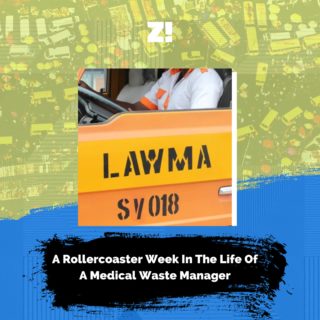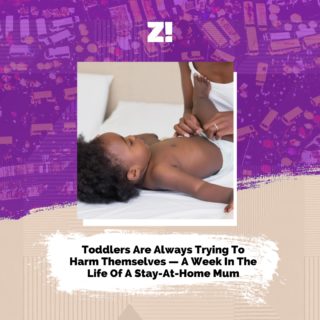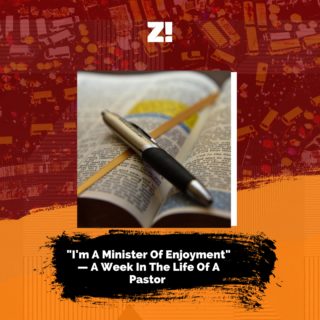“A Week In The Life” is a weekly Zikoko series that explores the working-class struggles of Nigerians. It captures the very spirit of what it means to hustle in Nigeria and puts you in the shoes of the subject for a week.
The subject for today is Mr A, a mortician. He talks about his first day on the job, people asking him for human parts, and why he lives intentionally.
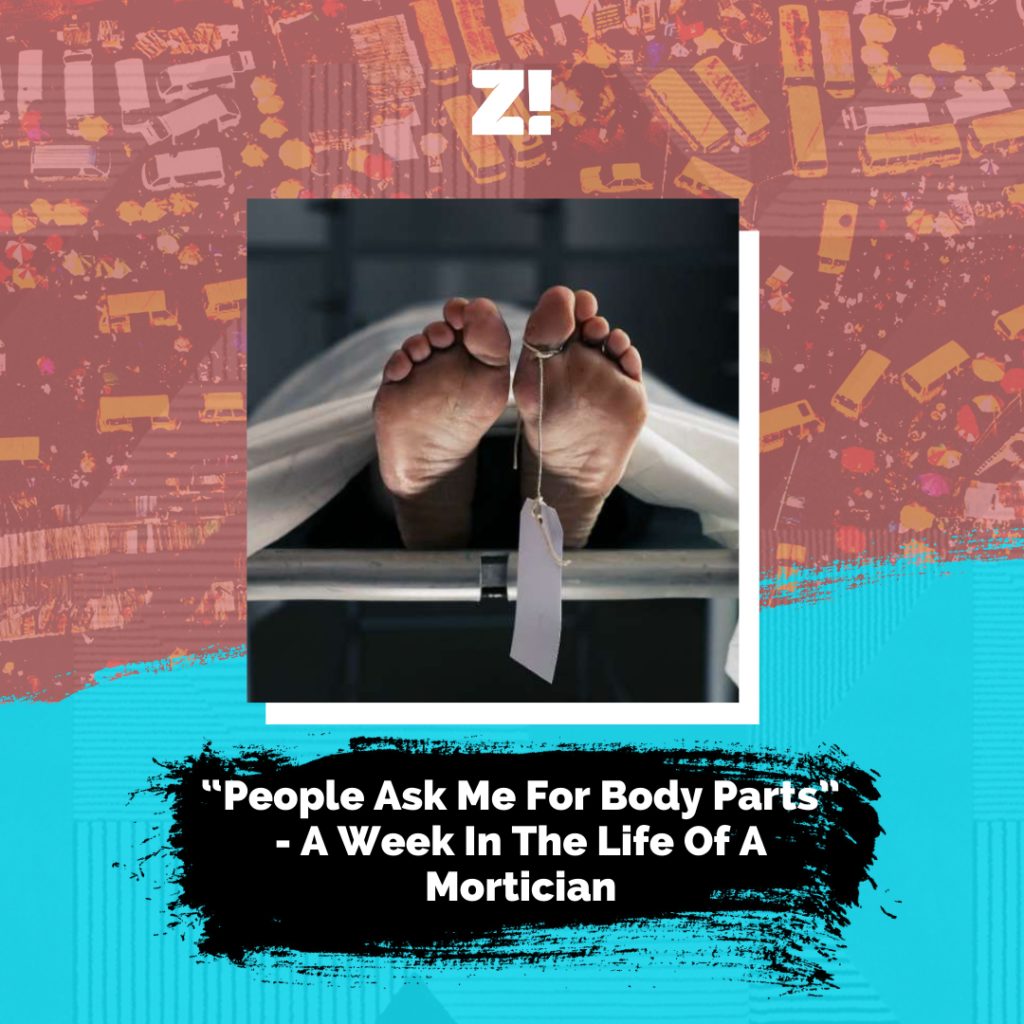
MONDAY – TUESDAY:
The sound of my phone ringing is the first thing that wakes me up today. Mid-sleep, I hear my boss shouting at the other end: “What do you know about the body that’s smelling in the department?” “Come to work now!” Before I can explain myself, she cuts the call.
I jump up from bed, have my bath and quickly rush down to work.
From the gate, I see people covering their nose. The source of the odour is a three-day-old body in the morgue. When the body got to the mortuary, the relatives couldn’t pay for embalming, so my boss didn’t release the necessary ingredients even after I pleaded for the go-ahead while the family members were out raising money. But now, because of the escalated smell, everyone is suddenly feeling charitable.
At the office, my boss is shouting, so I remind her of her role in our current situation. This calms her down. I then state my case: We can’t embalm the body until late at night because there’s no protective gear and I don’t want house flies from the body to lay eggs on me. I don’t want to carry a disease that’s not my own before people say I got an infection from being promiscuous. The government doesn’t care about our safety, so we must protect ourselves. Before I’m even done talking, the ingredients for embalming have appeared out of nowhere – she just wants the smell gone by this time tomorrow.
I tell her that all we can do is wait until midnight.
Midnight:
I like working at night because there’s no disturbance. I work faster because I have complete focus. Embalming is meant for social gathering, for people to pay last respects to the body in open caskets. In some cases, it’s used to “beautify” bodies that have been deformed through accidents – it helps hold the body together for a befitting burial.
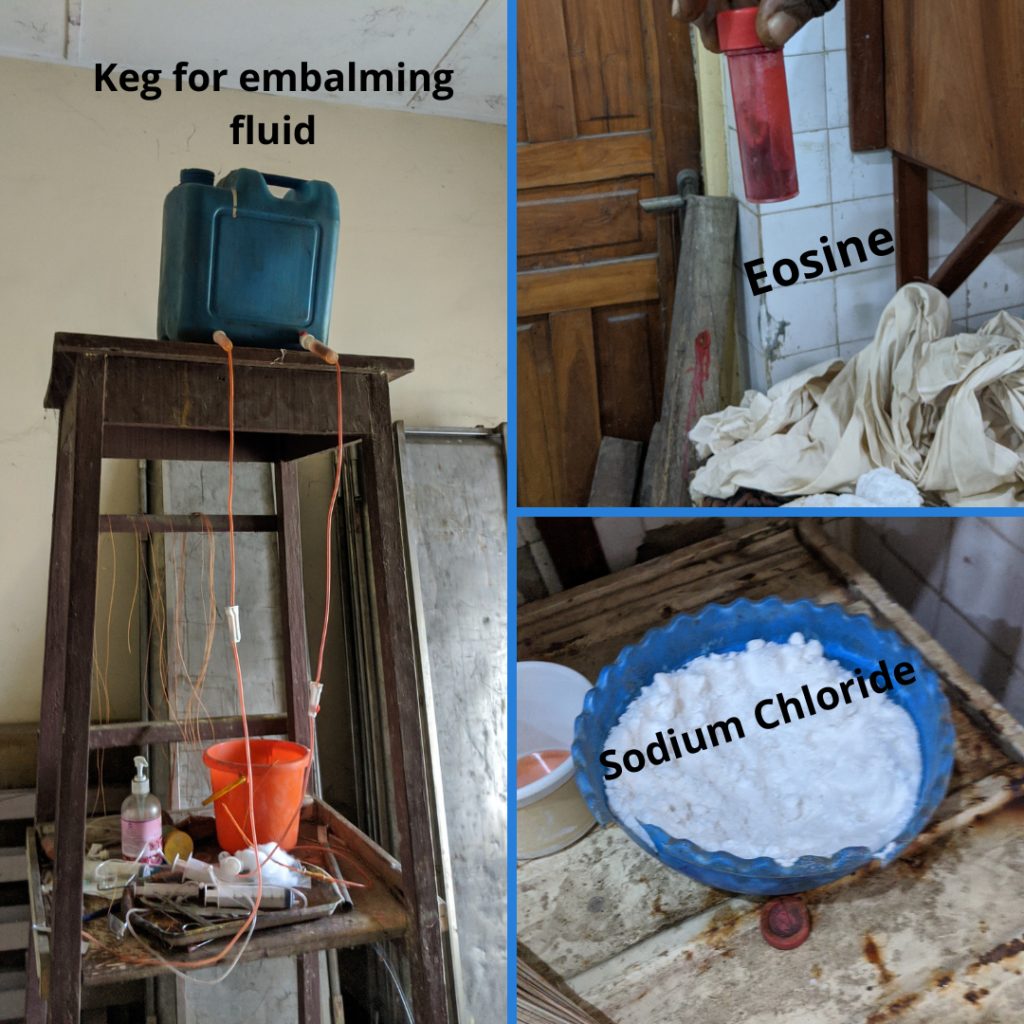
The embalming ingredients we use are sodium chloride, water, eosine and hydro formalin. Contrary to what people think, we don’t remove the organs when we embalm bodies. We mix the ingredients in a keg and set a line [in the femoral artery or humerus] for the body so that the fluid enters into the body. However, before doing anything, we first wash the body. [Editor’s note: Morticians don’t worry about smell after a while because it becomes part of the job]
I can tell that it’s going to be a long night ahead.
WEDNESDAY:
It’s funny that I started working with dead people because of the living. My old job didn’t allow me to spend time with my family and that’s why I chose this job.
One day, my friend asked if I was open to any other work and I said why not? As long as they pay me a salary and it doesn’t disturb family time, I’m ready. That’s how I started this work.
I’ll never forget my first day here because they put me on night duty. I sat down outside and my head doubled in size. I couldn’t sleep because someone on night duty shouldn’t be sleeping. I was just consoling myself that shebi day will break, today is today. That’s how I did the first night, then I did the second night too.
Then I now learned how to bath dead bodies.
I was so scared to hold their hand because I was worried that any small touch would disconnect the shoulder. I used to think that embalming made the skin parboiled, therefore any small touch would break the body. It wasn’t until one day when my senior colleague shouted at me to hold the hand that I got over myself. That’s how I used confidence to scrub the back of the corpse. Since then, I’ve become an expert. I can now bathe a body at any time of the day without help.
Today, I’m just thinking that with all my skill, someone should just come and tell me: “Let’s be going to America.”
THURSDAY:
Something happened at work today that made me happy. A man with a jeep came to the mortuary asking for “small human meat,” and my colleagues and I handled it well. I was glad to know that we haven’t allowed evil people to mix with us in this department.
I’m still wondering why someone would ask me for the flesh of a human being that I can’t create. So that curses will come to me? Or my children? God forbid.
He offered me ₦5 million and even houses. Little does he know that the bible has chained my hand and money can’t confuse me. My colleagues and I told him to check back in some days because when you pursue them away like that, they’ll be targeting you. They feel that you now know their face and what they do. The plan is that after some days, we’ll say that there are no fresh bodies because we embalm them immediately they come in. We’ll also say that if we cut out anything, we have no way to preserve it, so it’ll start smelling. That’s the story we are going with because even the bible says that bless thy child that uses wisdom to do things.
I remember another case where a woman came asking for cotton wool from the mouth of a dead person. She said she needed it to cure her daughter. I know that it’s used as a commanding tone when mixed with juju: if they tell you to stop, they don’t born you well not to stop. She even offered me money, but I told her that since it’s “healing,” there’s no need for money. I told her that I wished I could help, but we had no corpse with an open mouth. I then advised her with a sad face to try another mortuary.
Another time, a man came for that same cotton wool because his wife was wayward. This one even offered to soak it in the mouth of the corpse himself. So, I asked him if he’d bring any of his family members so he could soak it by himself for as long as he wants. For his family member, he can do whatever he likes because it’s unfair to ask me to do that to another person. I think that’s the first person I lost my temper for.
The problem with many people is that they don’t wait for God’s time. I know that if I’d been allowing such people, I would have built an estate by now. I’m not rich and I’m not poor, but I’m okay with my life.
FRIDAY:
This work has opened my eyes to many things especially how the world works. The wahala on a dead body is far more than the one on a living person and if you have eyes, it’s a lesson for how you live your life.
I heard of a case where the husband brought the wife to the hospital and she died. Then the woman’s family now claimed that the man divorced her, so he can’t bury her. To prevent a fight, the management told them to settle the matter in court. It has been almost five years and the woman’s family has refused to show up in court. Not even once. The body has been in the morgue since then. I heard that every Friday, the man still goes to the mortuary to check on his wife. He can’t even give her a proper burial, he can’t do anything. In this job, I have seen many cases like that.
I thank God for this understanding because it has made me focus on my family. I am the same age my father was when he died. His death meant that I couldn’t further my education, but I thank God for mum. She tried with what she had and I’m sad she didn’t get to enjoy more. I tell myself that if God can spare my life this long, there’s no reason why I should not spend all my money making sure my children go farther than I did.
Today, I’m thanking God for his mercies in my life. I can proudly say that I have one daughter who’s a university graduate, and another child about to enter the university. What more can I ask for?
SATURDAY:
I was telling someone today that money is not everything. If you give me a hundred million on one hand, and you put 10 minutes of advice, on the other hand, I’ll drop the money.
Advice will take me farther than money will or can. If I start with a hundred million, I’ll misbehave because money is a spirit. It’ll push me to talk to people that I should be avoiding. I know that I’m not a saint, so I know that I’ll offend many people.
I like this work because it reminds me to caution myself against the distraction of life. Life is simple, and you shouldn’t take anything hard. You should be humble. If you’re in a post, remember that one day, you’ll return to the soil. If you have that constant reminder, nothing will be too much to dash out.
See them here [dead bodies in the morgue], they can’t raise their hands, they can’t bathe themselves, they can’t do anything. See the morgue [opens vaults to show dead bodies], this is where we all end.
Editor’s note: Name changed to protect the identity of the subject.
Check back every Tuesday by 9 am for more “A Week In The Life ” goodness, and if you would like to be featured or you know anyone who fits the profile, fill this form.

